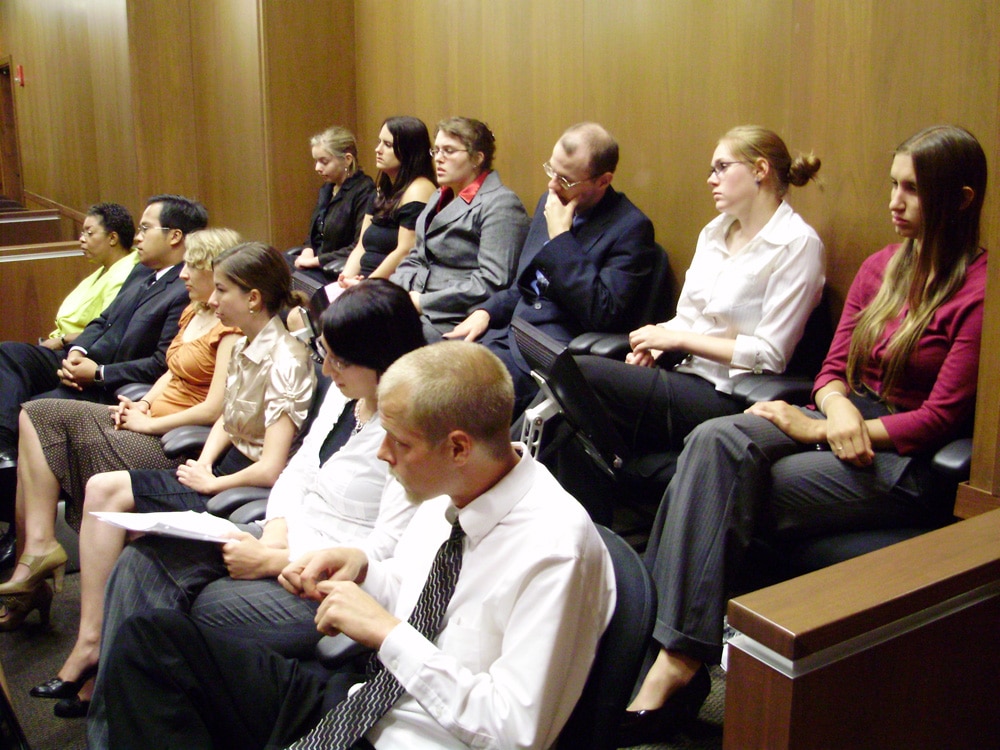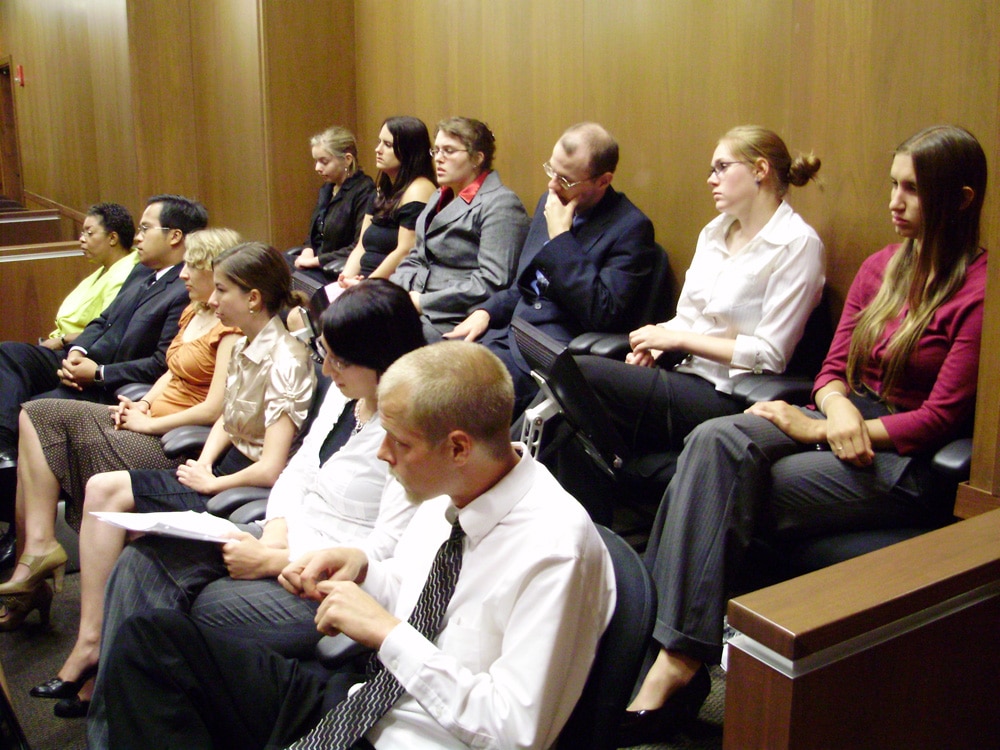If you want to serve on a criminal jury, the most important rule is this: Say as little as possible, with your words, your body language, and your appearance.
But why would you want to sit on a jury in the first place? Because in a criminal trial, if you can read and reason and resist being swayed by emotion, you will make a better juror than most of your fellow members of the community. A jury is the entity that acts as the voice of the community, and serving as a juror allows you to contribute to that voice.
You may also believe that the law under which the defendant is being prosecuted is an illegitimate use of state power. In that case, acting as a juror gives you the opportunity to exercise the power of jury nullification—finding the defendant “not guilty” regardless of whether the state has proven the accusation beyond a reasonable doubt.
This power to nullify an unjust law is as old as the institution of the jury; it’s a practice rooted in the principle that a juror can and should reach whatever verdict her conscience leads her to, and that there is nothing the government, or anyone else, can do to stop her beforehand or punish her afterward. Of course, the state prefers to maintain tight control over trials. In most jurisdictions, defense lawyers are prohibited from telling juries about nullification, and judges and prosecutors will, if pressed, lie and tell jurors they may not vote to nullify. But that is all the state can do to try to stop it. Knowing the truth will keep you from being deceived.
In 23 years of criminal defense practice, I’ve tried more than 40 cases before juries that I’ve picked, plus assisted and watched many more lawyers’ jury selections. I’ve made a study of the psychology and social dynamics of the process and taught the science and practice of it to countless lawyers across the country. I’ve learned that getting onto a jury to nullify illegitimate laws is easier when you understand the game that judges and attorneys are playing.
You are an intelligent, opinionated person who wants to share with your fellow citizens the fact that they have the power to follow their consciences in arriving at a verdict. This is admirable. But if you succumb to the temptation to do so during jury selection, your chances of being chosen drop to nil.
We call the process of turning a group of community members into a jury of six or 12 “jury selection,” but it is, by necessity, actually jury deselection. Each party can eliminate from the jury pool any person who has a bias for or against the defendant or a bias against any of the laws that are applicable to the case (this is a “challenge for cause”). Then each side can eliminate from the jury pool a fixed number of people for any reason at all, as long as that reason is not some form of proscribed discrimination (this is a “peremptory challenge”). The jury is the first dozen people (or half-dozen, in a misdemeanor case) remaining after both sides have exercised their challenges.
Lawyers find bias, and other reasons to strike jurors, in the things candidates say, the way they act, and how they look. As a practical matter, the first six or 12 people left after the lawyers have used all of their strikes are those who have kept their mouths shut and who appear ordinary.
Bias against “the law applicable to the case” is grounds for a challenge for cause, and while you and I know that jury nullification falls within the bounds of the law, the system in practice does not recognize that principle. Judges will bar defense lawyers from even mentioning jury nullification, and judges and prosecutors will lie to jurors about that power (or right, if you prefer, since the people’s rights are, of course, powers in relation to the state). A juror who expresses any understanding of her power to nullify bad laws will certainly be challenged by the prosecutor for cause and excused by the judge. Precedent is very clear that a willingness to nullify the law is a bias against that law, which is grounds for a juror to be stricken for cause.
The first challenge for someone who wants to be able to exercise his own sense of right and wrong in the jury room is—to be blunt—not to let the state know that he plans to do so.
Potential jurors are questioned under oath. As a philosophical matter, a person may feel that where the court and the state are lying to jurors about their power to nullify, jurors are justified in lying back. Perhaps you feel the power to nullify a law contains the power to nullify the oath to tell the truth, if that is the only way to exercise your right. But for our current purposes, let’s assume that you are unwilling to commit perjury for the sake of nullification—that you believe lying under oath is a greater evil than being excluded from a jury because you know about your right to nullify bad laws. In that case, if the prosecutor or the judge asks you explicitly about your power to nullify—“Ms. Jones, do you believe that a juror has a right to follow her conscience rather than the law?”—you will answer truthfully, and your truthful answer will likely get you excused from the jury without further questioning.
Lawyers in jury selection have a lot on their minds, however. They are also often afraid of “poisoning the well” by eliciting ideas they don’t want the other potential jurors to hear (including ideas about nullification). Now, this fear is irrational, since a juror who holds such a view but keeps it to himself will quietly carry the “poison” into the jury room. But even lawyers behave irrationally, and the chance you will be confronted with such a clear and direct question is slim.
Slightly more likely is a query such as, “By show of hands, who here believes in jury nullification?”
If you parse the question and the answer is inescapably “yes,” then not raising your hand is concealing facts from the court while under oath to tell the truth. If you do raise your hand, there will be additional questions, which may lead the judge to conclude that you have a bias against the law and should be stricken from the jury. At the very least, your speaking up will give the prosecution a reason to exercise a peremptory challenge against you.
Better, from your perspective, that prosecutors should use a peremptory challenge than a challenge for cause, since they have an unlimited number of the latter but very few of the former. Still, the objective of this exercise is to get on the jury. Fortunately, unless the defense lawyer has telegraphed to the prosecutor an intention to rely on nullification (a bad idea if she actually plans to do so, though an excellent diversion if she does not), you probably won’t get this question, either.
What is likely—especially with a case involving a relatively unpopular law, such as a law criminalizing possession of marijuana—is that the prosecutor or judge will ask a question along the lines of, “How many of you think that possession of marijuana should not be against the law?”
Fair Use Excerpt. Read whole article here.


